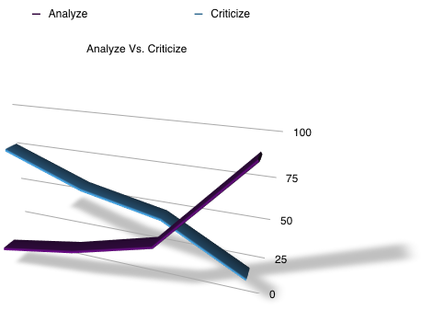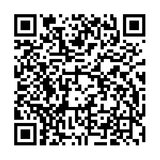The largest concept that has taught me the most in life is learning to...
RC: wow... dang dude... how'd you get so smart? like, I'm still shocked. for lack of a better term.
SM: lol, no idea
i dont see my self as smart as much as i would say i aman observer
learn to watch your world and learn from it
RC: ahhhh
SM: be experiential and allow everything to be a moment of Ahaa!
RC: I like that.
I would NEVER brag about being smart, however I would claim the skill of observing. You see, learning to observe is such a large part of my life that I put claim to the knowledge I have obtained as largely from the power of observation as much or more than study, reading and learning I have done over my lifetime. Now I would like to compare and contrast the difference between an analytical mindset and a critical mindset.
One comparison of the analytical vs. critical mindsets is - when we analyze we bring value to something, however a critical mindset tends to devalue and bring meaningless to something. See, when you are being critical of a person/system/program you begin to degrade it and reduce its value. One does this because their entire focus centers around the aspect of what doesn't work, what isn't great, etc... and almost always how they could do it better! So not only does this devalue someone/something it is also arrogant. This is not proper 'kaizen', a Japanese word for always understanding that you are doing the worst currently and there is a better way to do it for the sake of making small improvements to the whole for the better of all. Also 'hansei', which is a central idea in Japanese culture, meaning to acknowledge your own mistake and pledge improvement. Talk about the power of cultural language... to stop hansei means to stop learning altogether. This helps one to never become convinced of your own superiority so that you feel the openness to criticize others/systems/programs.
Analyzing is one of the main components of observation. Another comparison between the two is that observation creates self-worth in the one whom is observing because they are using the resources around them to view their world. They are not simply assuming nor asking someone else just to get a 'simple' answer, they are taking it upon themselves to observe what is the possible scenarios to analyze instead of assuming and criticizing. My dad use to always ask me if I assumed something wrong, "You know what happens when you assume?" I will not attempt to answer that question in the detail he would. However, I will say that flagrant assuming is asinine, but on the flip side there is power to assumption. In the world of observation I deduce the obvious to only a few relational options. How does the original attitude/act/scenario relate to the options? Then from there is where an act of common sense would be applied to our deduction, therefore not making a complete flagrant assumption, but instead a well-educated guess.
So how does this apply to how you observe a person/program/system? Maybe that boss isn't such an (insert explicative), maybe the program isn't the worst in the world, maybe the system isn't full of obvious flaws. Don't short-sight yourself for the sake of feeling mighty in criticism. You might want to read that previous line again. Criticism without corrective options is really inexcusable. So the boss/subordinate who has a bad attitude one day or never looks you in the eye, or whatever else "failure" he has in your eye, begin to see his/her strengths, focus on that. What would happen in your environment if you began to honor that person in their strength and then support them in their weakness. We tend to only see others weaknesses where we are strong. Take responsibility to the your own strength and be Aaron and Hur who held up Moses' arms as they were in battle. Just possibly you are gifted with strength exactly where your leaders is lacking in strength, just maybe that was not by accident, be responsible!Maybe he has unfair expectations, fine. Rise to those expectations and help him see the value in your reality instead of criticizing him and running your mouth to others to let them know how terrible of a leader he is. God knows he/she is in your life as your leader for a reason, what greater opportunity for you to learn and grow and develop your leadership skills. Don't ever take for granted the things that don't make sense, seem stupid or just meaningless!
Coaching moment:
Criticism without constructive corrective options is futile and unproductive!

 RSS Feed
RSS Feed





